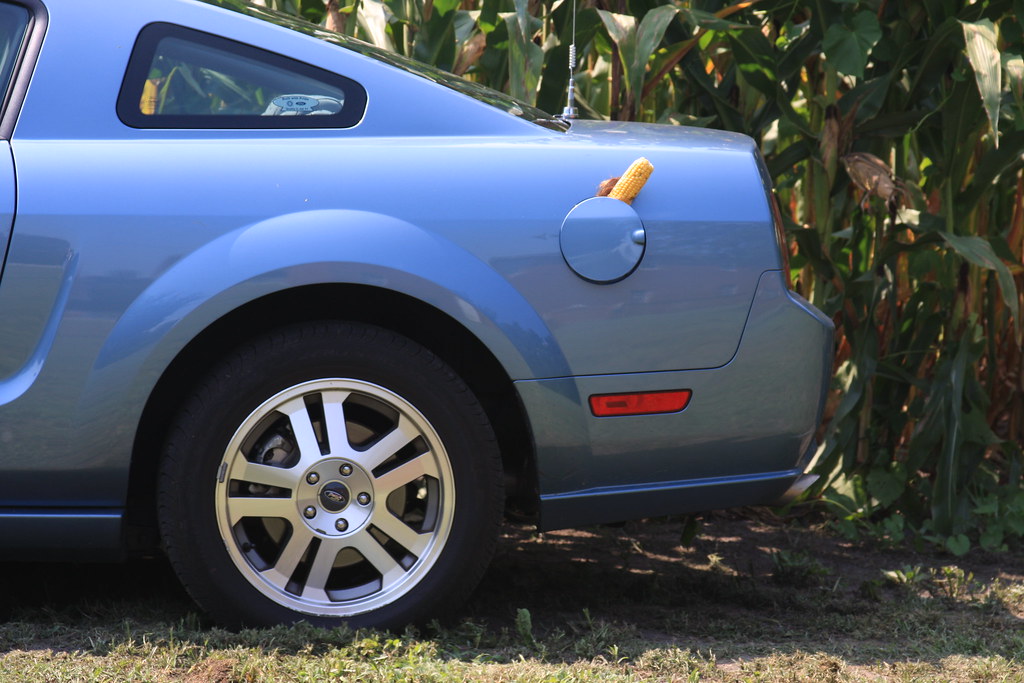The Mustang is in the Corn, but why is the Corn in the Mustang ?


As we emerge from a stand of corn we are given to wonder what in the world is corn doing in our fuel tank? It make more sense for the car to be in the corn field. By the way we used 5th gear for economy to get to the corn field and traveled within the posted speed limit for...most of the trip during which we thought the greenest of thoughts.
If you build it, they will come. We refer not to the movie line, but the construction of a farce as big as the Ritz and far more costly. It is a lie wrapped in false science and propelled by the "ethanol lobby." This is actually the "corn lobby" with a few extra bandits along for the ride.
Producing a gallon of ethanol costs 57 cents more than making a gallon of gasoline yet it has less than 2/3 the energy (BTU) value of gasoline. You're losing in both directions. Your mileage goes down, but your costs go up. Production of ethanol when blended in gasoline is an energy loss and it requires fossil fuels not solar power or windmills to produce. The ethanol used in the US to dilute our gasoline is produced by corn, the most heavily subsidized crop in the US. On top of that the ethanol producers, not individual farmers but corporate agri-businesses and blenders get a 51 cents-per-gallon tax credit which costs you an additional two billion Yankee dollars a year.
Ethanol from sugar cane contains a far greater BTU value than the relatively low energy from corn. The climate in the major agricultural acreage which now supports corn or wheat is not favorable toward sugar cane. The boys from Brazil have done a masterful job of producing ethanol from sugar cane and would sell us plenty, but....
The Ethanol Import Tariff of 1980 imposed a duty of 54 cents for EVERY gallon imported into the United States. Recent attempts to lower or remove this import penalty have been heavily opposed by lobbyists for the corn and ethanol producers. This was another put up job on behalf of the early ethanol speculators following the oil embargo which we also ignored in the early 1970s. Measures this absurd required bipartisan support.
Ethanol is more volatile than gasoline so it presents the need for more complex and expensive seasonal blending yet another excuse to bend you over at the pump. It also contributes a bit more to smog in major metro areas like LA, but not so much as you'd notice or care for that matter.
So, what the heck IS corn doing in our tank. Far from a fuel supplement, corn ethanol is siphoning away gasoline from our tanks and money from our pockets. We are not unlike chronic alcoholics who have matriculated to the level where we truly NEED Old Everclear 190 proof grain to stave off the DTs, but have been required by our government to purchase 80 proof Old Mr. Boston from Tiffany's and have it delivered by FedEx Priority Overnight.


2 Comments:
Yeah, Mustang, everything you said.
I've been reading about the corn vs sugar cane as a fuel source situation and noticed an article about the major sugar producer in south Florida that just agreed to abandon the cane fields completely so "wetlands could be restored.
How altruistic. Very Green?
Of course the towns. merchants and laborers who produced sugar for 100 years will be left high and dry.
Maybe wealthy corn farmers will hire them?
Hi Chuck.
Yes, what a great idea. Maybe the displaced people from the sugar industry will be hired as docents for the conducted tours of the restored wetlands. No doubt that, too, will become a tourist attraction.
We'll soon be feeding corn flakes to the Mustang.
Thanks for your comment.
Post a Comment
<< Home